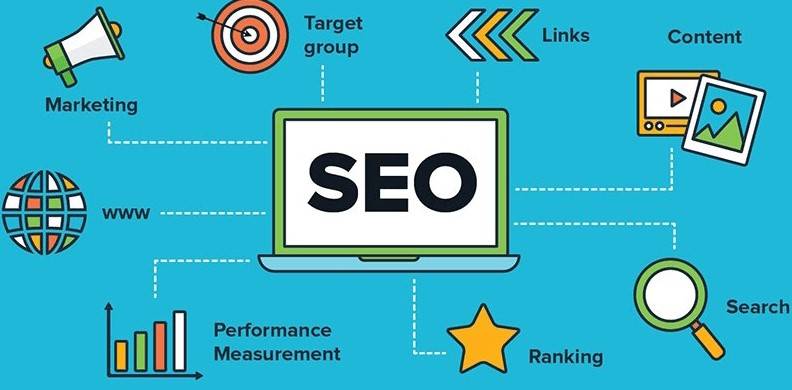Search engine optimization (SEO) is an essential aspect of digital marketing that helps businesses improve their online visibility, drive traffic, and generate leads. However, managing SEO campaigns can be daunting without the right tools. With numerous SEO tools available in the market, choosing the right one can be challenging. In this guide, we’ll explore the five best SEO tools in 2023 that will help you optimize your website and boost your rankings on search engines.

Table of Contents
- Introduction
- Ahrefs
- SEMrush
- Moz Pro
- Google Analytics
- Yoast SEO
- Conclusion
- FAQs

Introduction
SEO tools are essential for digital marketers and website owners to optimize their website for search engines. In this guide, we’ll explore the top five SEO tools that will help you analyze your website’s performance, conduct keyword research, track your rankings, and identify areas for improvement.
Ahrefs
Ahrefs is an all-in-one SEO tool that helps businesses with keyword research, link building, competitor analysis, and site audits. It provides detailed insights into your website’s backlink profile, keyword rankings, and organic search traffic. Ahrefs is a great tool for conducting keyword research, finding high-quality backlinks, and identifying content gaps on your website.
Here are some of the pros and cons of using Ahrefs for SEO:
Pros
- Comprehensive keyword research: Ahrefs provides one of the most comprehensive keyword research tools on the market. Users can research keywords for their website, competitor websites, and even see what keywords are driving traffic to specific pages.
- Backlink analysis: Ahrefs is widely regarded as one of the best tools for analyzing backlinks. Users can identify their website’s backlinks, analyze competitor backlinks, and find new link building opportunities.
- Site audit: Ahrefs can analyze a website’s technical SEO, identify on-page issues, and provide recommendations for improvement.
- User-friendly interface: Ahrefs has a user-friendly interface that is easy to navigate, even for beginners.
- Customer support: Ahrefs offers excellent customer support, including a comprehensive knowledge base, email support, and a live chat feature.
Cons
- High cost: Ahrefs can be quite expensive for smaller businesses or individuals, with plans starting at $99 per month.
- Steep learning curve: Although Ahrefs has a user-friendly interface, it can take some time to learn all of the tool’s features and capabilities.
- Limited content analysis: Ahrefs is primarily focused on backlink analysis and keyword research, so its content analysis capabilities are somewhat limited compared to other SEO tools.
- Limited social media integration: Ahrefs does not have a strong social media integration, meaning users will need to use another tool for social media analysis.
- Limited local SEO features: Ahrefs is more focused on global SEO than local SEO, so users looking to optimize their website for local search may need to use additional tools.
Overall, Ahrefs is an excellent tool for SEO professionals and businesses looking to improve their online presence. Its comprehensive keyword research, backlink analysis, and site audit capabilities make it one of the best SEO tools on the market. However, its high cost and limited content and social media analysis features may make it less suitable for smaller businesses or individuals.
SEMrush
SEMrush is another popular SEO tool that helps businesses with keyword research, competitor analysis, site audits, and social media management. SEMrush provides detailed insights into your website’s traffic, rankings, and backlinks. It also offers a comprehensive site audit feature that identifies technical SEO issues on your website.
Here are some of the pros and cons of using SEMrush for SEO:
Pros
- Comprehensive keyword research: SEMrush provides one of the most comprehensive keyword research tools on the market. Users can research keywords for their website, competitor websites, and even see what keywords are driving traffic to specific pages.
- Backlink analysis: SEMrush is an excellent tool for analyzing backlinks. Users can identify their website’s backlinks, analyze competitor backlinks, and find new link building opportunities.
- Site audit: SEMrush can analyze a website’s technical SEO, identify on-page issues, and provide recommendations for improvement.
- Competitor analysis: SEMrush provides detailed information about a website’s competitors, including their top keywords, backlinks, and advertising strategies.
- User-friendly interface: SEMrush has a user-friendly interface that is easy to navigate, even for beginners.
Cons
- High cost: Like Ahrefs, SEMrush can be quite expensive for smaller businesses or individuals, with plans starting at $119 per month.
- Limited social media integration: While SEMrush has some social media features, its integration with social media platforms is somewhat limited compared to other SEO tools.
- Steep learning curve: Although SEMrush has a user-friendly interface, it can take some time to learn all of the tool’s features and capabilities.
- Limited local SEO features: Like Ahrefs, SEMrush is more focused on global SEO than local SEO, so users looking to optimize their website for local search may need to use additional tools.
- Inaccurate search volume data: Some users have reported that SEMrush’s search volume data can be inaccurate, which can impact the effectiveness of keyword research.
Overall, SEMrush is an excellent tool for SEO professionals and businesses looking to improve their online presence. Its comprehensive keyword research, backlink analysis, and site audit capabilities make it one of the best SEO tools on the market. However, its high cost and limited social media integration and local SEO features may make it less suitable for smaller businesses or individuals. Additionally, some users have reported inaccuracies in the tool’s search volume data.
Moz Pro
Moz Pro is a comprehensive SEO tool that provides businesses with keyword research, link building, site audits, and rank tracking. Moz Pro provides detailed insights into your website’s link profile, domain authority, and page authority. It also offers a comprehensive site audit feature that identifies technical SEO issues on your website.
Here are some of the pros and cons of using Moz Pro for SEO:
Pros
- Site audit: Moz Pro provides a comprehensive site audit tool that analyzes a website’s technical SEO, on-page issues, and crawl errors, and provides recommendations for improvement.
- Keyword research: Moz Pro offers an excellent keyword research tool that allows users to discover and prioritize keywords based on relevance, search volume, and competition.
- Backlink analysis: Moz Pro provides a detailed backlink analysis tool that allows users to identify their website’s backlinks, analyze competitor backlinks, and find new link building opportunities.
- User-friendly interface: Moz Pro has a user-friendly interface that is easy to navigate and understand, even for beginners.
- Local SEO features: Moz Pro offers a range of features to help businesses optimize their website for local search, including location data management, local ranking tracking, and review management.
Cons
- Limited social media integration: Moz Pro’s integration with social media platforms is limited compared to other SEO tools.
- No PPC support: Moz Pro doesn’t offer any features for managing PPC campaigns, which can be a drawback for businesses looking to optimize their paid search efforts.
- Expensive pricing: Moz Pro can be quite expensive, with plans starting at $99 per month.
- Limited competitor analysis: While Moz Pro provides some competitor analysis features, it’s not as comprehensive as other SEO tools on the market.
- No mobile app: Unlike some of its competitors, Moz Pro doesn’t offer a mobile app, which can be inconvenient for users who need to access the tool on the go.
Overall, Moz Pro is an excellent tool for businesses and SEO professionals looking to improve their online presence. Its site audit, keyword research, and backlink analysis tools are comprehensive and user-friendly, and its local SEO features are a standout. However, the tool’s limited social media integration, lack of PPC support, and expensive pricing may make it less suitable for some businesses. Additionally, its competitor analysis features are not as comprehensive as some of its competitors.
Google Analytics
Google Analytics is a free web analytics tool that helps businesses track website traffic, user behavior, and conversion rates. Google Analytics provides businesses with insights into their website’s traffic sources, audience demographics, and user behavior. It also offers a comprehensive e-commerce tracking feature that helps businesses track their sales and revenue.
here are some pros and cons of using Google Analytics for website analytics:
Pros
- Free to use: Google Analytics is free to use for all users, making it a popular choice for businesses of all sizes.
- Comprehensive data: Google Analytics provides comprehensive data on website traffic, including pageviews, sessions, bounce rate, and conversion rate.
- User-friendly interface: Google Analytics has a user-friendly interface that is easy to navigate and understand, even for beginners.
- Customizable reporting: Users can create custom reports and dashboards to track the specific metrics that matter most to their business.
- Integration with other Google tools: Google Analytics integrates seamlessly with other Google tools, such as Google Ads and Google Search Console.
Cons
- Data privacy concerns: Google Analytics collects a lot of data on website visitors, which can raise concerns about privacy.
- Limited real-time data: Google Analytics provides real-time data, but it’s limited compared to other website analytics tools.
- Data sampling: In some cases, Google Analytics may sample data rather than providing the full picture, which can impact the accuracy of the data.
- Limited support: Google Analytics offers limited support for users who need help or have questions about the tool.
- Steep learning curve: While Google Analytics is user-friendly, it can still be complex and overwhelming for beginners to learn how to use it effectively.
Overall, Google Analytics is a powerful tool for businesses looking to track and analyze their website traffic. Its comprehensive data, customizable reporting, and integration with other Google tools make it a popular choice for businesses of all sizes. However, concerns about data privacy, limited real-time data, data sampling, limited support, and a steep learning curve may make it less suitable for some businesses.
Yoast SEO
Yoast SEO is a popular WordPress plugin that helps businesses optimize their website for search engines. Yoast SEO provides businesses with recommendations for optimizing their website’s content, meta descriptions, and titles. It also offers a comprehensive site audit feature that identifies technical SEO issues on your website.
here are some pros and cons of using Yoast SEO for website optimization:
Pros
- User-friendly interface: Yoast SEO has a user-friendly interface that is easy to navigate and understand, even for beginners.
- Comprehensive optimization: Yoast SEO provides comprehensive optimization suggestions for on-page elements such as meta tags, content, and image optimization.
- Content analysis: Yoast SEO provides detailed analysis of content readability, SEO-friendliness, and keyword usage.
- XML sitemap creation: Yoast SEO automatically generates XML sitemaps for your website, making it easier for search engines to crawl and index your site.
- Integrations: Yoast SEO integrates seamlessly with other popular WordPress plugins, such as WooCommerce and Jetpack.
Cons
- Limited keyword analysis: Yoast SEO’s keyword analysis is limited to the content you’re currently working on, and doesn’t provide keyword research tools.
- Limited support: Yoast SEO offers limited support for users who need help or have questions about the tool.
- Plugin conflicts: Yoast SEO may conflict with other plugins or themes, causing issues with website functionality.
- Premium features: Some of Yoast SEO’s most powerful features are only available with a paid premium subscription.
- Bloatware: Yoast SEO’s interface can be cluttered and overwhelming, with unnecessary features and options that may not be useful for all users.
Overall, Yoast SEO is a powerful tool for optimizing your website’s on-page elements and content for search engines. Its user-friendly interface, comprehensive optimization suggestions, content analysis, XML sitemap creation, and integrations make it a popular choice for WordPress users. However, limitations in keyword analysis and support, plugin conflicts, premium features, and bloatware may make it less suitable for some users.

Conclusion
SEO tools are essential for businesses looking to optimize their website for search engines. In this guide, we explored the five best SEO tools in 2023 that will help you analyze your website’s performance, conduct keyword research, track your rankings, and identify areas for improvement. Ahrefs, SEMrush, Moz Pro, Google Analytics, and Yoast SEO are all excellent tools that can help you improve your website’s search engine rankings.
FAQs
- What are the best SEO tools for beginners?
- Ahrefs, SEMrush, Moz Pro, Google Analytics, and Yoast SEO are all great tools for beginners.
- How do SEO tools help businesses?
- SEO tools help businesses optimize their website for search engines, drive traffic, and generate leads.
- What is keyword research?
- Keyword research is the process of identifying the keywords and phrases that people use to search for products or services online.
- How can businesses use site audits to improve their SEO?
- Site audits help businesses identify technical SEO issues on their website, such as broken links, missing meta descriptions, and slow page load times.
- Can SEO tools help businesses improve their social media presence?
Yes, some SEO tools like SEMrush offer social media management features that can help businesses monitor their social media accounts and analyze their social media performance.
In conclusion, SEO tools are essential for businesses looking to improve their online presence and drive traffic to their website. Ahrefs, SEMrush, Moz Pro, Google Analytics, and Yoast SEO are all excellent tools that can help businesses with keyword research, link building, site audits, and analytics. By using these tools, businesses can identify areas for improvement and optimize their website for search engines, ultimately helping them achieve their marketing goals.



